Business
How to be Successful Running a Restaurant Franchise, A talk with Cliff Bramble [Podcast]
Published
3 years agoon
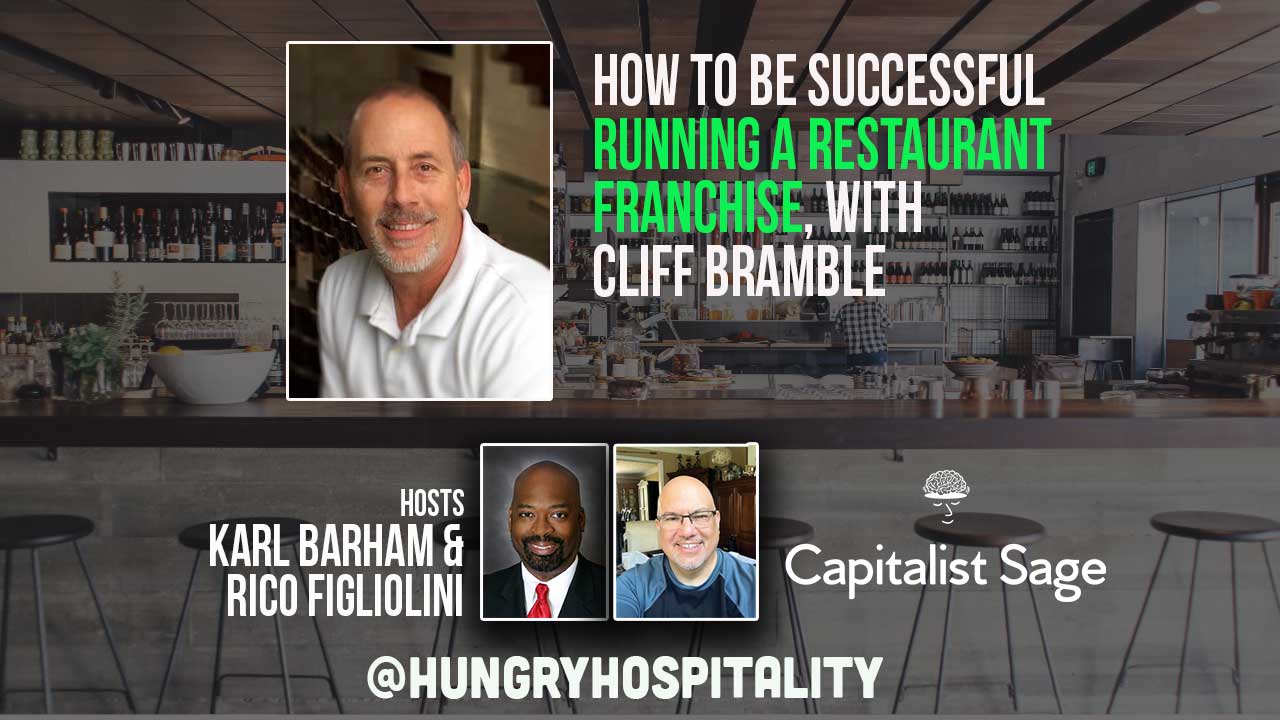
Sounds easy. Buy a franchise and you’ll be trained and off you go. There’s more to it than that. Cliff Bramble, founder of Hungry Hospitality, restauranteur, author of several books including, the Business Side of Restaurants, and found of Coursini – an online restaurant industry academy – shares his inside knowledge about what it takes to run a franchise.
Resources:
Hungry Hospitality Website: https://www.hungryhospitality.com
The Business Side of Restaurants Book: https://www.hungryhospitality.com/store/p14/Sample_The_Business_Side_of_Restaurants.html
Coursini: https://courses.restaurantindustryacademy.com/pages/welcomelanding
Timestamp:
[00:00:30] – Intro
[00:02:30] – About Cliff
[00:04:24] – Marketing a Franchise
[00:09:18] – Business Structure and Systems
[00:09:42] – Basic Tips on Better Bookkeeping
[00:17:38] – Budgeting, Scheduling, and Forecasting
[00:18:59] – Hiring the Right People
[00:20:45] – Training and Caring for Employees
[00:25:06] – Hiring in Non-Conventional Ways
[00:28:47] – About Coursini and Cliff’s Upcoming Book
[00:31:04] – Closing
“The consistency is key because it is part of training and honestly, part of the reason why I came up with some of these courses is the consistent training. If you hire somebody, and you continuously have turnover, you have to ask the question, is it you, or is it the person training? It’s a consistent message that will keep people employed and hopefully excited about their job.”
Cliff Bramble
Podcast Transcript
[00:00:30] Karl: Welcome to the Capitalist Sage Podcast. We’re here to bring you advice and tips from seasoned pros and experts to help you improve your business. I’m Karl Barham with Transworld Business Advisors, and my co-host is Rico Figliolini with Mighty Rockets Digital Marketing, and he is the publisher of the Peachtree Corner Magazine. Hey Rico, how are you doing today?
[00:00:48] Rico: Hey Karl, great. It’s been a beautiful, sort of a beautiful week. I mean, we’ve had some storms. We’re going to end up in the freeze zone soon, I think. But glad that we’re back on track with the Capitalist Sage with a great guest today. But before we get to that, I just want to mention our sponsor is Peachtree Corners Magazine. The sponsor of the family of podcasts that we do this one, including Peachtree Corners Life and Prime Lunchtime with the City Manager. So check those out. You can find those podcasts anywhere you listen to podcasts, on iHeartRadio, Spotify, and others. Or watch the video podcast on YouTube or our Facebook page.
[00:01:26] Karl: Excellent. Well, Rico, this is our fourth year now. We are starting our fourth year doing the Capitalist Sage and providing information to folks here in Georgia and Peachtree Corners area, as well as out there in the internet world. Just talking business with local business owners and folks that share some of their wisdom and knowledge and experience with our audience. Today, it is my privilege to introduce a return guest, Mr. Cliff Bramble, a local Peachtree Corner resident. And he’s also the founder of Hungry Hospitality, LLC. He’s a local business owner and an author of several books on business and restaurants and many other things. And today we’re going to get a chance to talk about some of the success secrets of operating successful food franchise businesses, and some of the tools that people should be considering and thinking about in 2022 to make their business better, stronger, more resilient than ever. Cliff, how are you doing today?
[00:02:26] Cliff: Fantastic, Karl, thank you very much for having me on. I really appreciate it.
[00:02:30] Karl: Oh, our pleasure. Why don’t we start off, tell a little bit about your history. Folks that may not know you, tell you a little bit about your background and some of the stuff that you’ve done.
[00:02:39] Cliff: Well, I don’t want to go too far back, it’ll make me look like I’m really old. So I’m just going to start with the last like 20 years. But in the last 20 years, I previously owned Noble Fin here in Peachtree Corners. And unfortunately COVID really shut me down pretty quickly over there. But before that I was a co-founder of Rathbun’s restaurant from 2004 a ll the way until 2020. So that’s about 17 years over there. And it was a great ride. We opened up Rathbun’s, Kevin Rathbun Steak, Krog Bar, KR Steak Bar. And then before that I worked for Buckhead Life Restaurant Group in Buckhead in a place called Nava that was happening for many years. And I’ve owned a couple other businesses before that. And then I was in California before that opening up hotels in Southern California. All the tough parts, La Jolla, San Diego, Rancho Mirage, Palm Desert. You know, it was all the tough parts.
[00:03:30] Karl: I hear you. Well, we got you back here in Georgia now, and we’re really grateful for that. Why don’t we jump in on this topic that we wanted to chat about. When I talk to business owners all the time, there’s a large amount of folks that own and operate franchises. One of the most amazing things to me, franchise is a great opportunity for those that want an established structure and brand that they can focus on executing and operating a business, and they don’t have to think of everything from scratch. But one of the key components to success is really just the fundamentals of operating a business and especially a restaurant or a food based business. And so I’m wondering if we could talk a little bit about some of the things you’ve learned in running, especially a restaurant food business that you think a lot of franchise folks don’t really get about being successful. Anything that comes to mind to start?
[00:04:24] Cliff: Well, the first one would be the marketing. Simply because I have had one or two franchise clients over the years, and the marketing is always the most important factor, especially when it comes down to individual owners owning a franchise. So I say marketing is always the first one.
[00:04:44] Karl: Absolutely. Well, let’s talk about marketing for a little bit before we jump to the next one. Most franchises, one of their selling points is we help you with marketing and there’s, whether it’s national campaigns going on or they might provide marketing materials and signage and logos and so on. What are some of the things that you think as an individual local business owner, they should be focusing on and investing in marketing? Why don’t we start about with how much would you recommend people invest? How much of their revenue, or do you have any ideas around that? And then what specific things they could be doing?
[00:05:17] Cliff: Well, yeah, there’s a little percentage wise that people have spoken about over the years saying 1% of your sales really goes to marketing or advertising. I say marketing rather than advertising. But for the local people, the most important part of the franchise and especially being a local franchise. I have not been one, but as far as somebody being in the local, is really knowing your surroundings. And now people can spend a lot of money on marketing, but if they’re doing social media and they’re collecting people’s information. For example, if they are restaurant, and even if it’s a small bread company, for example, or a small little sandwich place. Everybody who’s walking in, if they can get their customer email and their phone number and know them, you know what having that as a social media base and a direct marketing so they can send people information is a huge benefit.
[00:06:07] Karl: When I think about businesses, especially when we look at selling a business, we typically talk about their marketing strategy they do. Something that’s appearing more and more now, they talk about the number of followers, their digital marketing there. So, as an actual asset, it’s not something you can touch and feel, but it is an asset in the business that can be quantified. And what you’re talking about, capturing their information, getting them to follow them on social media, can actually have value beyond just generating more sales.
[00:06:38] Cliff: There’s no question about it. And I’m just finishing up a book called the Marketing Side of Restaurants. And I will tell you, one of the areas in there, one of the chapters is specifically on this. And the reason I say this is because there was somebody who, a client that I had previously, it was a hair salon. And I’ll give a quick example, the hair salon, they were wondering why they were having problems. Number one, they weren’t making enough money. That was the first problem. So I said, all right, let me come in and check it out. And as I looked at everything, I said, okay what do you want to do? And their response was, we want to close this and we want to move up to another place and it’s up the street, because it’s a better location. So ultimately I said alright, where is your database of all your individuals, all your clients? We don’t have a database. All we have are first names and we have some people’s phone numbers. So my response was well, if you move, how are your customers all going to know where you moved? You know, so, in a matter of a very quick time, because they had so many people’s phone numbers, they ended up getting people’s names, numbers, using them on Facebook, using them on Constant Contact, even MailChimp. And it really helped them tremendously.
[00:07:45] Rico: Are you finding anything different over the last year or so with marketing because of COVID even? Has any new innovations happened over the last year or two?
[00:07:54] Cliff: Well yeah, there’s a lot of innovation, especially for the restaurants. You know, for example, when you go and pay at the table now, and a lot of people hand you a little handheld, you can actually punch in your email into some of those as a loyalty program. So the loyalty programs are very good to have, especially on a smaller franchise. Because the loyalty, people feel like they’re getting something out of that too, rather than just writing down an email. But the loyalty side is a good factor. And that has come in, into full force right now.
[00:08:22] Karl: I know the top line of revenue is always important and franchise owners very often will just a hundred percent depend on the franchise to do their marketing. If I’m hearing you right, doing your own marketing and development, they don’t help you with all of it. They may give you the tools, but if you don’t use them, you’re not really going to get the benefit.
[00:08:42] Cliff: Well, you know, it goes back to that whole, you can lead a horse to water, but you can’t make them drink. Somebody told me many years ago, if you have a guest in your restaurant, and if you call them by their name seven times within that time that they’re there, they will be back within a week. And that’s a huge factor of getting to know the people. And I know, a lot of franchises will pay the 4 or 5, 6% every single week or every month, depending on how they have it set up. But knowing the local market is very important too. And I think that as the smaller franchisors work in their area, they know their customers rather than the franchisee who may be six states away.
[00:09:18] Karl: So after marketing, what would you say would be the second thing that you see franchise owners of food businesses missing when they’re going out there and trying to be successful?
[00:09:29] Cliff: Well, a lot of it has to do with the structure. People have to have structure in their business and that goes with any area. So they have to have structure of the invoices coming in. They have to have a system and having those systems in place are highly important.
[00:09:42] Karl: You’re absolutely right. Let’s expound a little bit more on the systems that people have. There’s a management of kind of cash and making sure that it’s accurate your financial systems in there. Anything that you think, tips that you’ve learned along the way that helped you to be successful in understanding money coming in and out?
[00:10:02] Cliff: Absolutely. Number one is the first part is the invoicing, because if you don’t have a system on your invoicing those invoices come in, they come in every single day. If you don’t have a system, the invoice comes in, it goes to the invoice box, it gets checked, it gets designated to a special account. And then it gets logged into the chart of accounts into the computer, the accounting program, and then it gets filed. If you don’t have that set up, you’re just going to have a problem because at the end of the month, you might think that you did fantastic. But you may be missing five or six invoices. Knowing that is in my opinion, highly important. And having somebody in the bookkeeping side know about that area is very important too.
[00:10:39] Karl: Well, let’s talk about bookkeeping because that is one huge pet peeve of mine. Oh boy. When you think about a business, I always equate accounting and bookkeeping to your scorecard. So if the data that’s going in is wrong and there isn’t attention to it, what it’s producing for you to be able to make decisions is going to be flawed at best and possibly cause you to fail ultimately. Why is it that so many people have struggled with this bookkeeping stuff?
[00:11:07] Cliff: I honestly, I think sometimes they’re afraid of it, you know. But you’re always afraid of what you don’t know. They always say if you know something, you’re always going to go back to it. So if you were promoted to a chef, but you were first a general manager, you’ll always be able to go back to that general manager. But when you really break it down in the accounting side and bookkeeping, there’s really only three areas that you have to look at all the time. You have to look at your general ledger because whoever’s punching that information in, if they are punching it in the wrong code, for example, it’ll show up on the general ledger. So in addition to that, they also have to look at their income statement and they have to pay attention too, and not just look at the top sales line and the bottom profit or loss. And hopefully it’s a profit. Maybe there’s a fear of tackling it, but only taking five minutes every single month to look at this information, isn’t really enough. You have to look at your balance sheet. You have to look at your general ledger and you have to look at your income statement. But you have to be excited about it too. And there’s not enough people who are excited about numbers, unless they’re making money.
[00:12:10] Rico: Let me ask you something, between industries too is it a little different, little easier bookkeeping? For example, restaurants, point of purchase sales. It’s coming in on the iPad or whatever you’re taking it in on. So it’s going straight to your bookkeeping at some point, right? Automatically.
[00:12:25] Cliff: It goes straight to the point of sale system. So the income goes to the point of sale system. So you can just run a report every single night. But if you own a hair salon, the same exact thing goes. There’s somebody who’s punching in the sale every day. At the end of every day, they run a report on the point of sales. The key to that Karl, is closing out your sales, every single day. You have to do it. If you don’t do it, you’re just going to run into a problem.
[00:12:49] Karl: Isn’t it similar to the analogy of if you have a closet or a room in the house and you don’t clean it every week, and then at the end of the year, you’ve got to go in and clean all of that. That’s kind of how some people run their bookkeeping. They wait until the end of the year they had invoices. They had expenses that have come in, in February. And it has PFL or something. They don’t know what it is. They end up with large miscellaneous expenses because they didn’t track it. But I think your key point, there is a combination of knowledge which can be learned. Talk to us a little bit about how can people get better at basic, you don’t have to be an expert. What are some things that can help them get better at learning how to read enough financial statements so they can run their business successfully?
[00:13:36] Cliff: It’s interesting that you ask that because I just started something called Coursini, which is a, it’s geared to franchises. There’s a whole page that’s geared to franchises as well, but basically they’re online courses and they’re courses on balance sheets. There’s courses on general ledger, it’s really simple information. And these courses, for example, they’re available online. You can take them for 10 minutes, 20 minutes at a time. You can take them on an airplane. But the nice part is, you’re learning something about it. You can read from a book. But I will tell you, in my opinion, the courses are really good. The courses are good and one more thing I want to mention about this is that on a weekly basis, the franchisees or whoever it is running their business, they should have a cashflow statement printed pretty much every single Friday. That will help them a lot. And you know what? It may make them more interested in those reports.
[00:14:24] Rico: As far as the bookkeeping part goes, because I do my own invoicing. But I have a bookkeeper that comes behind me. So every month she’ll spend two or three hours a month to make sure she cleans up whatever I’m doing. And to prep the file, so this way we don’t have that problem at the end of the year, at the end of the quarter. And I use QuickBooks, I can go on my app on my phone. I can see what my balances are. I can see what my costs are. I could look and pull reports right off my phone. And I’m sure even the point of purchase stuff can be integrated into a QuickBooks or some system like that. Where it just comes straight across and it doesn’t take a rocket scientist to do some of that. Right. I mean, is that?
[00:15:02] Karl: Absolutely. I know ways that people can get their bookkeeping pass down to 15 minutes a month if they set up their chart of accounts. And if you don’t know what a chart of accounts is, you need to learn something, take a course or get a book. The general ledger, once you set up your chart of accounts, you can with Quickbooks Online, and some of the other tools that are NetSuite and others, you can automate probably 90% of the transactions in there. Once it’s set up, you go in and you check to make sure that the numbers are right and so on. And it simplifies the bookkeeping. The other part is a regular cadence, weekly or monthly reviews of it. Whether it’s your bookkeeper that you outsource, whether you do it yourself, allocate an hour to go through that. And there’s the old saying of balancing checkbooks. Nobody does that anymore. Well, each month you should balance out your QuickBooks for the month to make sure you have a P and L statement that’s accurate to reflect that month, the profit and loss statement. But these systems are some of the core things, if you’re in a business, it is your scorecard. And just investing more time, money, resources, to get competent enough to know whether your accountant or bookkeeper is doing it right, is really important to success.
[00:16:18] Cliff: You know, as a business owner, I’m going to tell you this you, you mentioned it right on. The bookkeepers, they’re great. They are doing what they’re doing. The accountants are doing what they’re doing, but you know what, they’re only as good as what the information is that you give to them. So I always say double check your accountant. Because they’re going to appreciate it, and you are too. You may not be able to double check the depreciation side, but at the same time, you can check everything else from the charter, from the general ledger. That general ledger there is your best friend. And if everybody looks at that at least once a month, the information gets punched in from the bookkeeper or the owner of the business. They just have to pay attention to it.
[00:16:57] Karl: And this is an area that franchises don’t cover. When you go on franchise training for two weeks, they do not go into detail on bookkeeping. They say, you have to do that on your own. So finding other courses, resources to get yourself educated is key. Even if you choose not to do it yourself, you should at least understand what a general ledger is, what it looks like. The cash flow statement, balance sheet, and a P and L statement. If you know what those four things then, and the general ledger, you’re in good shape. Let’s go on with structure a little bit more. Let’s talk about the people side. What kind of structures do you see being really important for people to master in running a franchise food business?
[00:17:38] Cliff: Well, the structures, they have to have the budgeting. They have to know about the scheduling. And they have to deal with the forecasting as well. So that’s one area, I say that’s one area all together. There’s three areas in one. If they’re creating a structure with their budgeting and they’re doing the same thing every single week. Every Friday they get their cashflow, every Monday they maybe send out all their checks. And they’re doing the schedules every single week and the schedules are based on their sales. So the sales go back to the budget. It all kind of works all hand in hand.
[00:18:07] Karl: This is the key thing. I think what you’re describing, I typically call a planning function. And if you want to have a predictable output, it always starts with a plan. I’d hate to try to build a house kind of ad hoc. Usually people would sketch out the bathroom should go here and the kitchen should go here and they build it from what’s in the wall first. And then they finish it at the end. With a business, having a plan of knowing what you’re going into, how much labor you’re going to need, what’s your material costs. So each week you can compare it to what you planned, some target. If you typically spend $5,000 a week on food. At the end of the week, you check if you’re 3000, you did better. If you’re 7,000, you want to know why. If you start getting multiple weeks of that, you can make an adjustment or a correction before the end of the month where you now have to register a loss.
[00:18:57] Cliff: Bingo. That’s exactly right.
[00:18:59] Karl: These are critical things. What about on the people side? Hiring, onboarding. I’ve seen franchises give you some guidance of how to hire people, but I don’t know if they do as good a job on how do you onboard people and train them. Especially in the food business where turnover tends to be higher than some other businesses.
[00:19:18] Cliff: Exactly. Well, you know, when it comes down to the hiring. Again, you have to have a system in hiring. Right now, the system for hiring is people just looking for people. They need bodies. And, but at the same time, there’s a lot of people hiring and you’ve got to hire the right person. Because if you hire the wrong person, there’s a saying out there it’s easier to hire somebody, it’s tough to fire them. And in Georgia, that might be a little different as a right to work state. But you want to hire the right people and you want to interview the right way as well. And somebody came up to me the other day and I said, oh, how was your interview? They said, boy, I couldn’t get a word in. And I said really? That’s interesting. I said, you couldn’t get the word in. And uh, you know, I said, it’s supposed to be the other way. So when you hear that, it’s important to hire the right people, make sure they have the right skill set. And also, you know, once they’re on board, make sure you’re training them the right way. And that goes back to the structure as well. Because if you’re not training them and you’re just handing them a key and you’re saying, okay, this is what you do. You know what, those first five days, that new employee is going to make up their mind whether they’re going to stay or whether they’re going to go.
[00:20:19] Rico: The idea that you were saying, it’s easier to hire than fire. When you hired the wrong person that team member poisons the rest of the team. You know? So, that’s one. And that’s hard to reverse. And then the other side of that is, especially in the food business I’ve got to believe, the chef may be doing a great job, but because that server brought it out badly and didn’t get it to you the right way, you might have a bad experience, right?
[00:20:45] Cliff: Yeah, you’re absolutely right. And part of the training, and I mentioned this before in my courses online on Coursini, I can tell you that one of them is human resources. One of the courses is human resources, and I had to break it down into five parts simply because of the fact of, there’s one on hiring. There’s one on payroll. There’s one on taking care of the employees. You have to take care of the employees. You have to train them, you have to care for them, you have to have some empathy these days. There’s a lot of variables that are going into what’s hiring and Rico, you asked earlier what’s changed? You know, the hiring has changed too. Because when people show up and they have a mask on, you don’t really know what to do. It’s a little, it feels weird. And then you say, okay, they see you without a mask and they ask you, is it okay if I take my mask off? And so right there, the, you have to have something that kind of lets the casualness come back and feel a little more comfortable because it is a little odd these days.
[00:21:38] Rico: Yeah. That can be interesting, interviewing someone wearing a mask. You never see their face.
[00:21:47] Karl: It is, but I think you’re highlighting something there, Cliff. The owner of the business and most small businesses franchise are operator owned. And they set the tone for the business. So if you have a mask policy and the owner or the manager, doesn’t wear a mask, it’s really hard to get other people to follow it. They’re going to follow the lead of the leader. The other part of that is, is you talked about the five sections of kind of, training around employees. There are some laws out there you’ve gotta be familiar with so that you don’t cross the wrong line. And franchises often don’t cover that in training because every state laws are different. So knowing how to handle unemployment, workers’ comp, how to handle harassment issues and protect yourself, making sure you’re covering labor laws, overtime. There’s a whole bevy of laws that you need to be aware of. You don’t have to be a master of, but you need to be aware of, and you need to let your managers know, and your employees know these specific things. If you’re going to have employees in your business.
[00:22:48] Cliff: The other big part about that, Karl, is right now with so many people working from their home and a lot of people have just said, okay I might be employed in Georgia, but I’m going to go travel. They’ve given up the house. And next thing you know, they’re living somewhere else. So what you have all of a sudden, you have to sit back and say, okay wait a minute. They’re living somewhere else, do I pay payroll taxes in Georgia? Or do I pay it in Texas? Where do I actually pay them? So then they’re going to, sometimes it’s easier to look at, there’s a PEI company where you can actually start looking at hiring people under something else rather than yours. But these days, Rico again, to your point earlier, what’s changed. For a lot of companies and I don’t know how many franchises have individuals who work either out of their office or out of state. But they have to look at and make sure they’re paying people the right payroll tax per state code as well.
[00:23:35] Karl: Absolutely. The other aspect is values of the business. Rico talking about service and so on. If that’s important in your business, clearly articulating the values and service expectations consistently with the employee base is critical. And if you’re suffering from turnover where every, three to six months, you’re bringing on new people, you need a system in place to constantly train and retrain those people. And it’s gotta be something that’s on demand and that’s accessible, et cetera for that. So these are some of the things, investments, that people should be considering in 2022 if they really want to start seeing major shifts in performance in their business.
[00:24:20] Cliff: Well, the consistency is key because part of training and honestly, part of the reason why I came up with some of these courses is the consistent training. If you have, and I’ll give you a good case. If you hire somebody, and you continuously have turnover, you have to ask the question, is it you, or is it the person training? In addition to that as an independent for example, if you’re a franchisee or franchise and you’re doing the training, that’s great. But what happens when you step away? Is somebody training them the same exact way, and there’s no way for you to quantify that or unless you’re having tests and you have a structure. But the on demand courses that are out there right now, and especially what I’m doing with the Coursini, it makes it easy. And it’s consistent and it’s a consistent message that will keep people employed and hopefully excited about their job.
[00:25:06] Karl: I’ve seen some of these systems, people could invest in under $10,000 a year under $20,000 a year, yet avoid much higher costs from either non-compliance or not being able to cover all the topics because managers are doing three or four jobs at a time. There’s a lot of hidden costs in not addressing this training slash putting these systems in place for their business. So it’s definitely something folks should think about and consider going forward. Since COVID has changed the nature of work. And when we’re seeing this shortage of workers and all these other types of things impacting franchise, is there any tips you could share with recruiting and hiring how to find people in non-conventional ways? I understand ZipRecruiter and Indeed, and everything could be done online. But sometimes you find the best people through your networks elsewhere. What are some of the things people could invest in to help with that?
[00:26:08] Cliff: There’s a million different ones online. There’s a few, there’s one I won’t even mention the name, but I know if I put something on there, I’ll get a hundred resumes from a hundred different states in all different countries. And so you want the right one. But the one area that works the best is the employees that are working there. Ask them for their friends, because people like to work with people that they know. And they’re not going to bring in somebody who’s a slacker, for example. They want to work with people who are actually good people. So in my opinion, asking those individuals if they could recommend any friends, is a very important aspect of maintaining, retaining your employees. It has to be people who are good and they want to work with each other. But when you start looking elsewhere, I always say this, you’ve got a 50-50 shot when you’re hiring somebody from the outside. You’ve pretty much almost got a hundred percent shot when you’re hiring somebody, who’s a friend of somebody who works there. But more importantly, you have to take care of all the employees. You can’t go to your employees if you’re just not the best manager. And you’re always asking them to bring people in, because they’re going to say well, I don’t know if my friend’s going to want to work with the person. Treating the employees and hiring, they all go hand in hand. You have to take care of the people.
[00:27:20] Rico: It almost sounds like, if you’re getting it from a team member they’re invested in that team. Cause you don’t want, talking about before, you don’t want someone that’s going to be a slacker, let’s say. And then everyone’s looking at that one person saying we’re doing and all the work he’s like always taking a 10 minute break doing something else. But yeah, no. That makes a lot of sense. I’ve found that referrals from personal people makes a lot more sense.
[00:27:41] Karl: And in our business, we actually pay for referrals. So if one of the team members refers somebody successfully, we pay referral bonuses for folks and as part of that. But I think you’re hitting on the key point. The work that needs to be done first is making sure that you’re an environment that people want to refer into. Think about it this way, if your own employees are not excited to refer people to come work with them, what you’re looking at is probably employees that are at risk to leave. If they’re getting feedback, there was a time where people used to get employee surveys or feedback. You don’t have to hire a fancy company to get feedback, have lunch with your employees, ask them how things are going, ask them their opinion, ask them how you can improve and how the business can improve. Or you can do a survey yourself, but get the feedback so you could improve the things that might be poisoning some folks in that work environment. It could be a manager that you love, but treats everybody else terribly. You need to get that feedback, that 360 feedback, to help address those.
[00:28:46] Cliff: Great points. Absolutely.
[00:28:47] Karl: Listen, Cliff, I really appreciate some of the insight that you shared with us today. I do realize that when you’re operating food businesses, it’s already challenging with very slim margins. You get some help with a franchise, owning a franchise. But we wanted to make sure people realize whether you own one today or you’re thinking of owning one in the future. There’s gaps in the information that you get from the franchise. Not intentionally, they just can’t cover everything. And supplementing that with whatever resources, investment, and time and money to help train yourself and your managers and your team. And Cliff, some of the work you’re doing and sharing out there and what you’ve developed and what other people have developed is really helping to hit that. Why don’t you tell us a little bit more about Coursini and the franchise course that you developed? And share how can people find out more.
[00:29:39] Cliff: So they can go to Coursini.Com It’s a C-O-U-R-S-I-N-I.com. It’s really made of mini courses. That’s really how I came up with the name. It sounds like it’s Italian, but I don’t think it is. Basically there on the franchise side, there’s a franchise about 40 different courses in there from finance to marketing, to hiring individuals, to running a business, starting the business. I mean, there’s a lot of stuff in there and so we’ve made them really reasonable on a subscription basis. In addition to that, I’m just finishing this book. It’s called the Marketing Side of Restaurants. This is the last of the two of the series. The other one was the Business Side of Restaurants. This one here is a, it’s a less than a hundred pages. And you know what, it’s all on marketing. There’s so much information in here. And part of it, was again, I go back to the franchise or any restaurant or any small business owner. There’s so many individuals that have a tough time marketing. And this book really tells them what they need to do on a pretty much social media basis, on a publicist basis and also a collection of people’s information so that they can actually get to know their people, the customers a lot more. So it’s a good thing, you know, and the goal is online courses, 24/7, on demand. And through the Coursini classes, I mean, you could be on the beach and taking these courses. And the feedback that I’ve received from the individuals who have taken the courses has been really great. So there’s videos in there, there’s tests in there, there’s all kinds of information and we’re excited to get it going.
[00:31:04] Karl: Excellent. I’m glad that we have someone here in Peachtree Corners that’s helping to share some of the knowledge that they have and more importantly, help serve the business community. If you own a small local franchise or a business, and you have a gap in training and getting information to folks, please do check out and support Cliff here in the community, as well as really look at it for your own self. How are you investing in you and your team to be better in 2022? You’ve survived the pandemic, at least the bulk of it. Now it’s time to thrive in your business. So, we want to thank Cliff Bramble, founder of Hungry Hospitality, LLC. And we want to thank you for your insights and sharing your experience with us once again.
[00:31:46] Cliff: Thank you very much for having me.
[00:31:48] Karl: Our pleasure. Well, today I just want to say Rico and I are glad to be starting off our fourth year doing the Capitalist Sage Podcast. I’m Karl Barham with Transworld Business Advisors of Atlanta Peachtree. Our business advisors are available to help consult on your business, whether you’re looking to improve it, grow it, and exit your business. We consult on your business, help you with evaluation, but really help you with your plan for the future. We kind of think of ourselves as a form of retirement advisor for business owners. One day you may want to step away from the business and having a plan in place and a resource in the community here that can help you with the sale of your business or acquiring a business. It’s just part of the strategy for success. So reach out to us at www.TWorld.com/AtlantaPeachtree. Or you could email me Karl Barham KBarham@TWorld.com. And I’d love to set up a consult with you to talk through any issues you might be having in your business. Rico, why don’t you tell us a little bit about what you’ve got going on?
[00:32:48] Rico: Sure. First, I want to say thank you to Cliff again for being on the show. I always learn a lot from Cliff. It’s amazing. No really, truly, I’m serious. And Karl too, because I learn a lot from you too. And I wish I was in the restaurant business, crazy, but yes. I’m happy where I am. So I’m good in publication.
[00:33:14] Cliff: You could get a job though. There’s a lot of people looking for restaurant people right now, I’ve heard.
[00:33:20] Rico: Yeah. Yes. I could do that $15 an hour job. At least they raised the wage a little bit, so that’s helpful.
[00:33:26] Karl: They have.
[00:33:26] Cliff: Don’t be fooled, they make more than that.
[00:33:29] Rico: Yes, I know with the tips and everything. But I’m glad where I am. I publish Peachtree Corners Magazine, and that’s fine for me right now. In fact, I’m looking at launching a second publication. I will have more news about that in a month or so. But besides that I do Mighty Rockets, which is a digital marketing company. So if you’re looking for video production, photography, content, Social media management. You could reach out to me, just find me on LinkedIn. It’s Rico Figliolini. And that’s easy to spell if you know how to spell it, F-I-G-L-I-O-L-I-N-I. I’m one of maybe two or three on there. So it’s easy enough to find me. The other one would be my brother and he’s in Canada. So you can’t use him. He’s not in this business. I’m excited because we’re working on the next issue. We’ve just put out our largest, 88 page issue just this month. Actually beginning of December, we’re working on a next issue right now, which is the best of Peachtree Corners and Reader’s Choice Award. So we’re in the midst of a survey right now. And so far within a week, we’ve had over 400 respondents on it. It’s going to be a nice.
[00:34:31] Karl: Rico, why don’t you tell us how do people access the survey? Where can they find it?
[00:34:35] Rico: Sure. So if you go onto LivingInPeachtreeCorners.com, you’ll scroll down just a little bit and you’ll see a graphic that says Reader’s Choice Award Survey, and you can take that survey there. And five of those that actually participate in this, will get a $75 cash Visa gift card later, drawn at random. So this way, some incentive for coming in. Give your opinion of best restaurants, summer camps. I could have made this a really long survey. So I, but I didn’t. I kept it down to a certain categories. But do that. And the next thing that we’re actually launching right now, and I just posted it online is Faces of Peachtree Corners. So we’re going to choose 20 people, from 12 and up that have a great story to tell what they’ve done, giving back to the community and all that. So check that out also, and nominate someone if you think they’re worthy enough to be there. But that’s where I’m at and this is always a great conversation to have.
[00:35:28] Karl: As I’ve been driving around too, just a heads up for folks, I notice a lot of the local schools are having open houses over the next couple of weeks. I think Wesleyan and Cornerstone, if you’ve got young kids looking for schools, it’s that time of year where people are starting to think about schools for next year, next season. So check out online and all the local schools are having their open houses right now. Greater Atlanta Christian and all the other private schools and public schools. Go check them out.
[00:35:56] Rico: Amazing how many schools serve this area that aren’t even in Peachtree Corners. Woodward academy, there’s a bunch of places, Brandon Hall. So Wesleyan obviously. Greater Atlanta Christian, Cornerstone, of the private schools anyway.
[00:36:08] Karl: Absolutely. Well, we want to thank everybody again. Tune in, we have a great schedule of guest speakers and guests for the show for this year. We’re going to keep doing this and sharing, talking about business. It’s kind like inside baseball, inside business for Peachtree Corners and surrounding areas. So thanks everybody for your support and look forward to talking to you.
Related
Business
Peachtree Corners Grows Business Opportunities Through Economic Development
Published
3 days agoon
May 6, 2025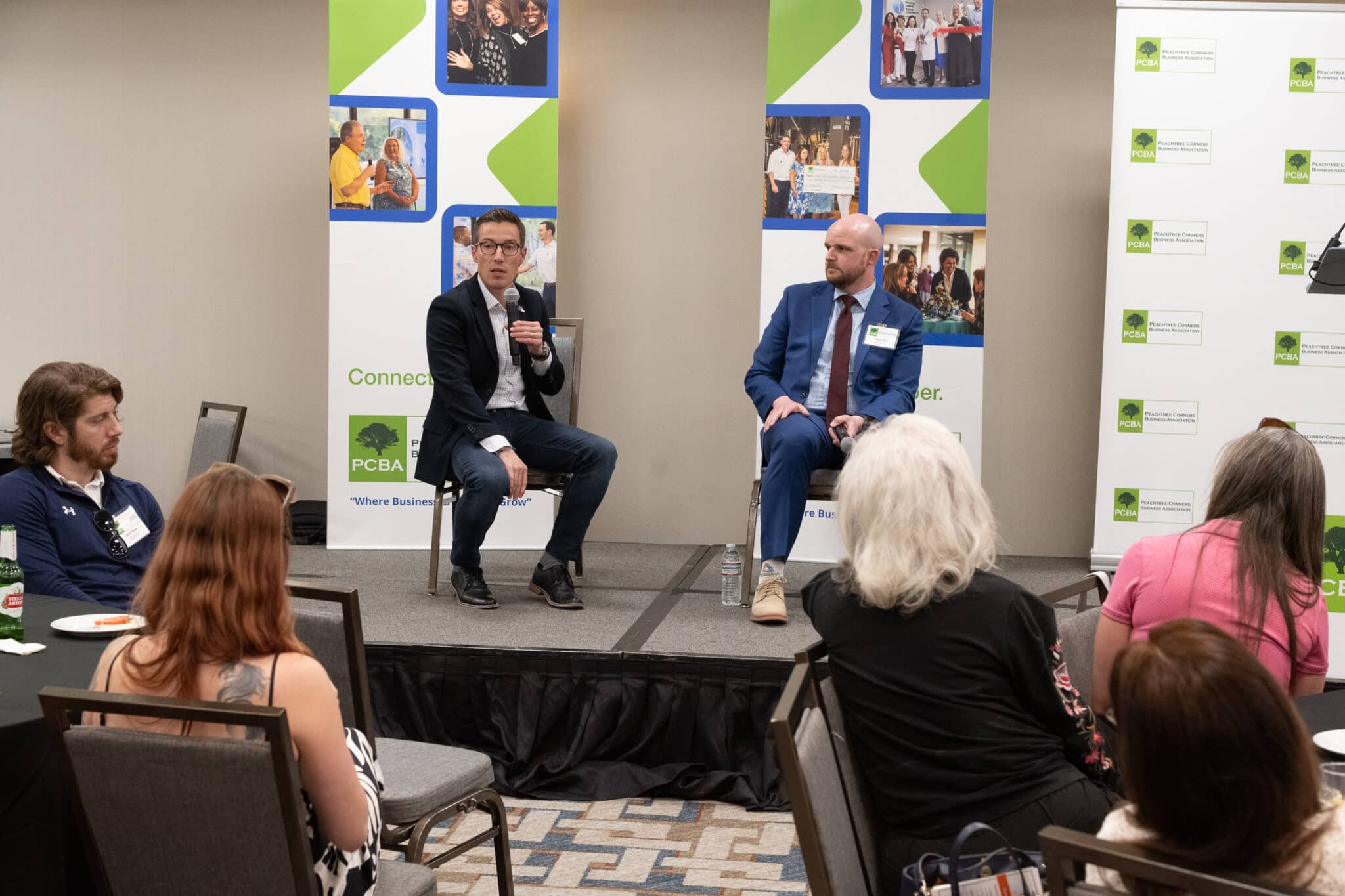
Most residents and business owners in Peachtree Corners probably think they know all about the economic development and strategic planning of Peachtree Corners, but do they really?
Peachtree Corners Business Association invited Peachtree Corners Economic Development Director Betrand Lapoire and Partnership Gwinnett Director of Economic Development Andrew Hickey to its After Hours Speaker Series on March 27 to discuss the city’s growth from a 1971 master plan to a bustling city with 42,000 inhabitants and 40,000 jobs.
Key points included the importance of business retention and expansion, with 24 projects last year creating 1,600 retained jobs, 1,600 new jobs and $250 million in new capital investment.
The Curiosity Lab, a world-class innovation center, was emphasized as a significant attraction. The city’s zoning and infrastructure plans were also discussed, focusing on balancing office and residential development to maintain a vibrant, sustainable community.
Matching jobs to residents
Although Peachtree Corners is just a teenager in terms of being an incorporated city, the foundation for this vibrant, fast-paced economic hub was laid more than 50 years ago by technology pioneer Paul Duke.
“Peachtree Corners was the first master-planned, business innovation technology park in metro Atlanta,” said Lapoire. “It was in response to the brain drain of technology with Georgia Tech graduates leaving the area.”
While the city may have a small-town feel, it’s the largest in Gwinnett County by population, but not land mass, he added.
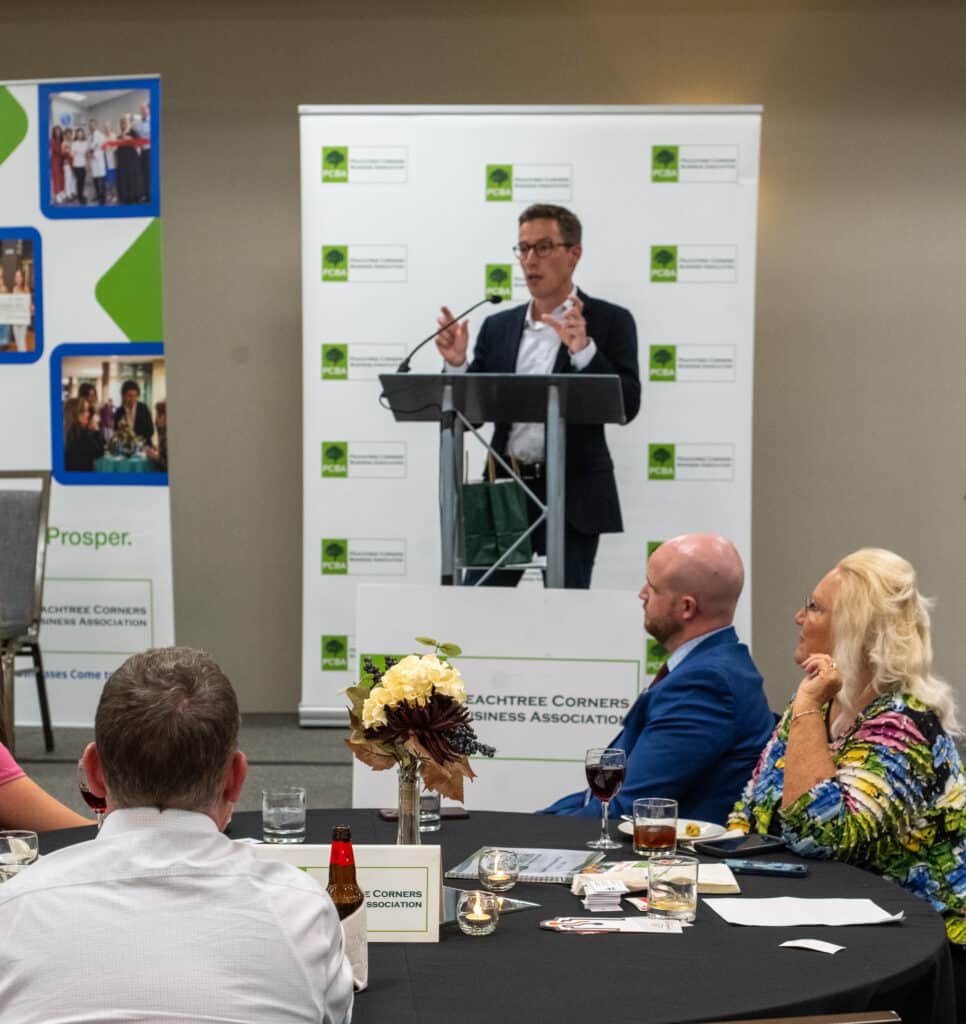
“The city started from a commercial, industrial, R&D base and then was expanded around it,” said Lapoire.
Though home to more than 42,000 residents, most of the jobs in Peachtree Corners are filled by people who live outside the city, he added.
“So we have this interesting mismatch, in a way, although not unusual,” said LaPoire. That creates traffic and transit issues. So that means that one of the solutions is to create more jobs here to fit the profile of the community.”
He presented charts that show professional services, consulting and engineering as the largest job categories. The next tier of businesses are wholesale and manufacturing.
“So we have a good mix of industry,” he said.
A five-year plan
The city has a five-year economic development plan (2023-2028) that outlines strategies for attracting and retaining businesses, with education and workforce development being key components.
Partnership Gwinnett has similar goals as Peachtree Corners, but on a larger scale.
“We are the county’s sales and marketing arm for all 17 cities now, and we receive funding from both municipal sources as well as existing businesses here — both in Gwinnett and outside of Gwinnett as well,” said Hickey.
He shared how Partnership Gwinnett is designed to drive a lot of major corporations toward doing business inside and with Gwinnett County.
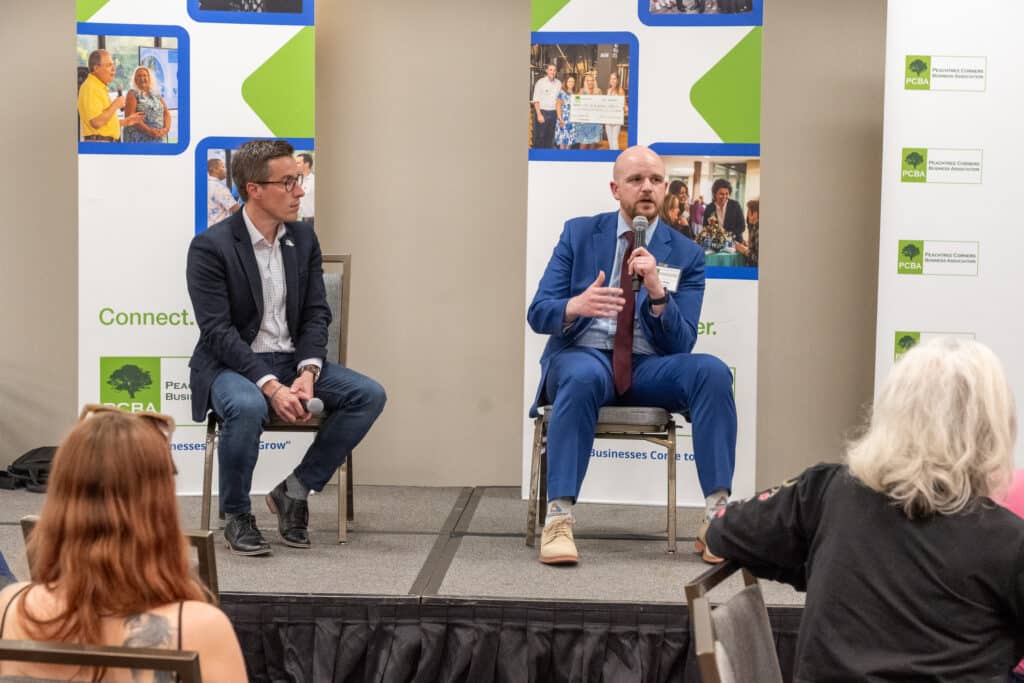
“One of the biggest things that we talk about that I’m sure it seems like most of us here, if you live here, you work here, you understand it. It’s the diversity that exists here in Gwinnett,” he said. “With a diversity index of 85, that means if we walk out of the Hilton here and we say hello to somebody, there’s an 85% chance they’re from a different ethnic or cultural background than ourselves, which to you and I may seem normal because that’s the life that we live in.”
He added that for companies, there’s a tremendous value in that, whether they have stated values, or they’re just making hiring decisions to get a wide range of candidates to fill those roles. Additionally, because of the proximity to Atlanta, Gwinnett County has a great labor draw.
Partnership Gwinnett
Partnership Gwinnett plays a significant role in recruiting businesses, expanding existing companies and developing the workforce. Hickey showed how the organization was involved with more than 24 projects last year.
“A majority of those were expansions, and that is a common thread you’ll see in economic development,” he said. “In business retention, expansion is so vital to working with our existing companies to make sure that they have the resources they need.”
He added that’s what leads to new investment and job creation in the community.
The organization also focuses on redevelopment projects, working with cities and the county to improve infrastructure and community amenities — especially strong educational institutions such Georgia Gwinnett College, Philadelphia College of Osteopathic Medicine and others.
Quality of life
In closing, both men stressed the importance of recruiting companies and developing the workforce, along with one aspect that means a lot but may not be as obvious — quality of life.
“It’s definitely evident that people like to work where they live — the whole live, work play experience,” said Hickey. “I joke that the part that people really have the most questions about, and are most excited to learn about, is new events at The Forum or Gwinnett Place Mall.”
Although they want to know what’s the next major company coming to Gwinnett, people REALLY want to know about how to spend their leisure time.
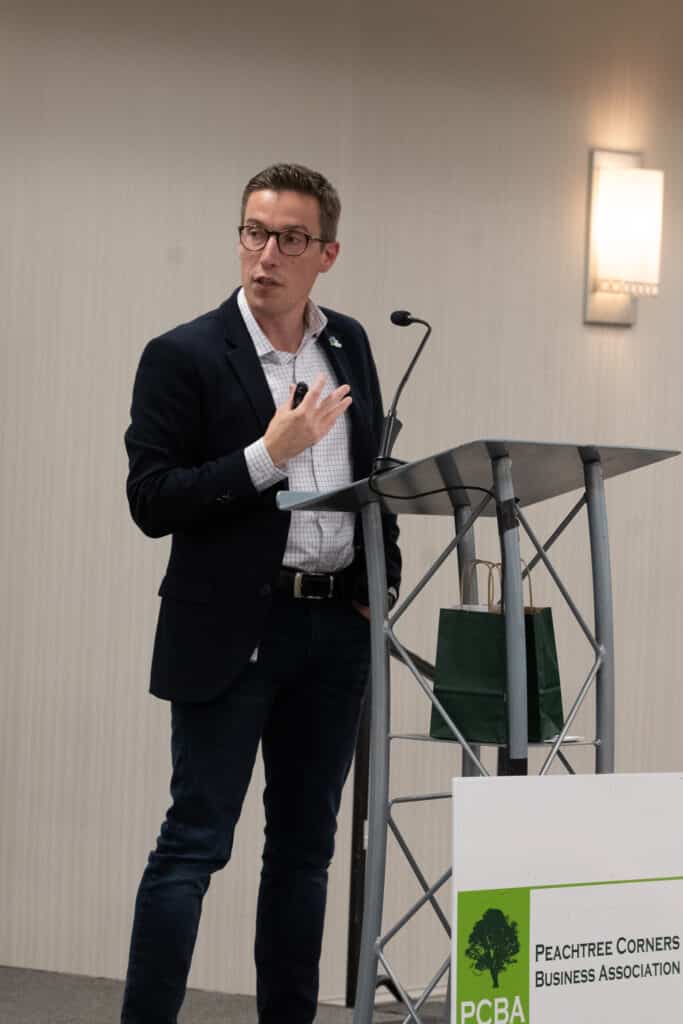
“That speaks to the importance of ensuring that we have a great community,” he said. “So at Partnership Gwinnett we work with all of our cities, and the county government as well, [on] a kind of a best-practices trip.”
He added that the peer tour allows everyone to know what the neighboring communities are doing and share the good news.
“We will take all of these elected officials, but also city staff, to different cities across the Southeast,” he said. “Last year, I believe they went to Huntsville, and have been to Greenville, Chattanooga — all cities that have done some really cool redevelopments that have taken their city to the next level. Our goal is to learn from them.”
Related
Business
Two Peachtree Corners Business Leaders Named Finalists for EY Entrepreneur Award
Published
2 weeks agoon
April 23, 2025
Ernst & Young’s Entrepreneur Of The Year celebrates ambitious entrepreneurs who are shaping the future
Ernst & Young LLP (EY US) recently announced the finalists for the prestigious Entrepreneur Of The Year 2025 Southeast Award, and two local, Peachtree Corners business leaders — David Quirk, president and CEO of DLB Associates Consulting Engineers PC and Erin Hanson, founder and CEO of Guardian Sports — made the list.
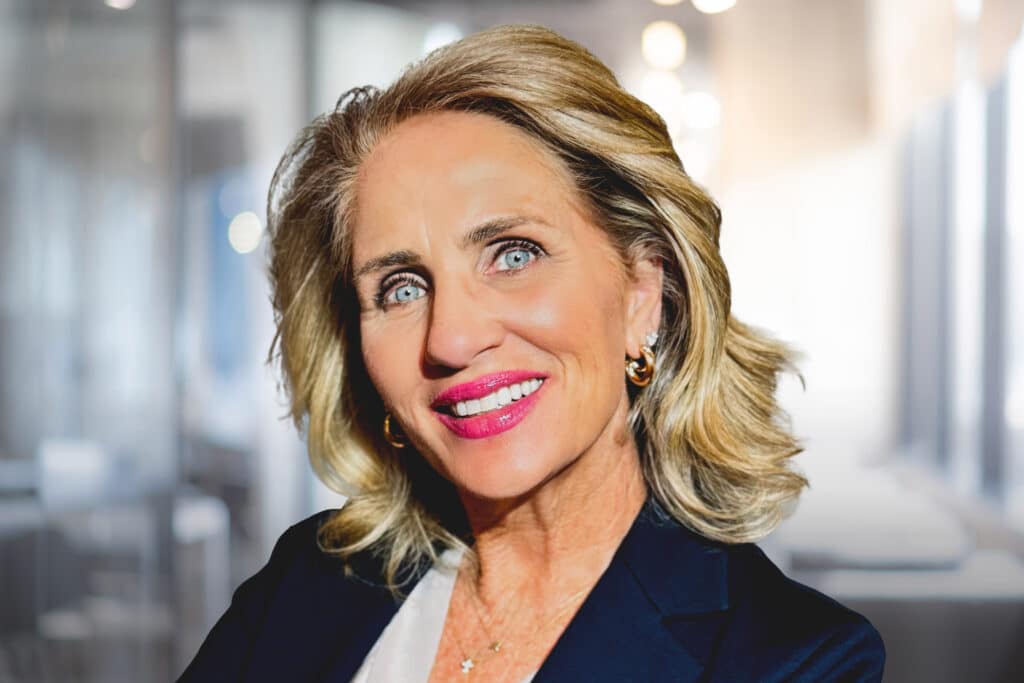
Hanson’s Guardian Sports is a family-owned company dedicated to serving athletes through safety and performance improvements in sports equipment. Major products include the Guardian Cap, PEARL ball and Guardian Infill serving the sports industry.

DLB Associates is a U.S.-based consulting engineering firm specializing in mission-critical and complex built environments. With more than 40 years of expertise, DLB delivers innovative, technology-driven solutions in engineering, commissioning and operations worldwide.
Celebrating entrepreneurial leaders
Now in its 40th year, Entrepreneur Of The Year recognizes the bold leaders who disrupt markets through the world’s most ground-breaking companies, revolutionizing industries and making a profound impact on communities. The program honors those entrepreneurs whose innovations shape the future and pave the way for a thriving economy and a hopeful tomorrow.
The Southeast program celebrates entrepreneurs from Alabama, Georgia, North Carolina, South Carolina and Tennessee.
An independent panel of judges selected 36 finalists for their entrepreneurial spirit, purpose, growth and lasting impact in building long-term value.
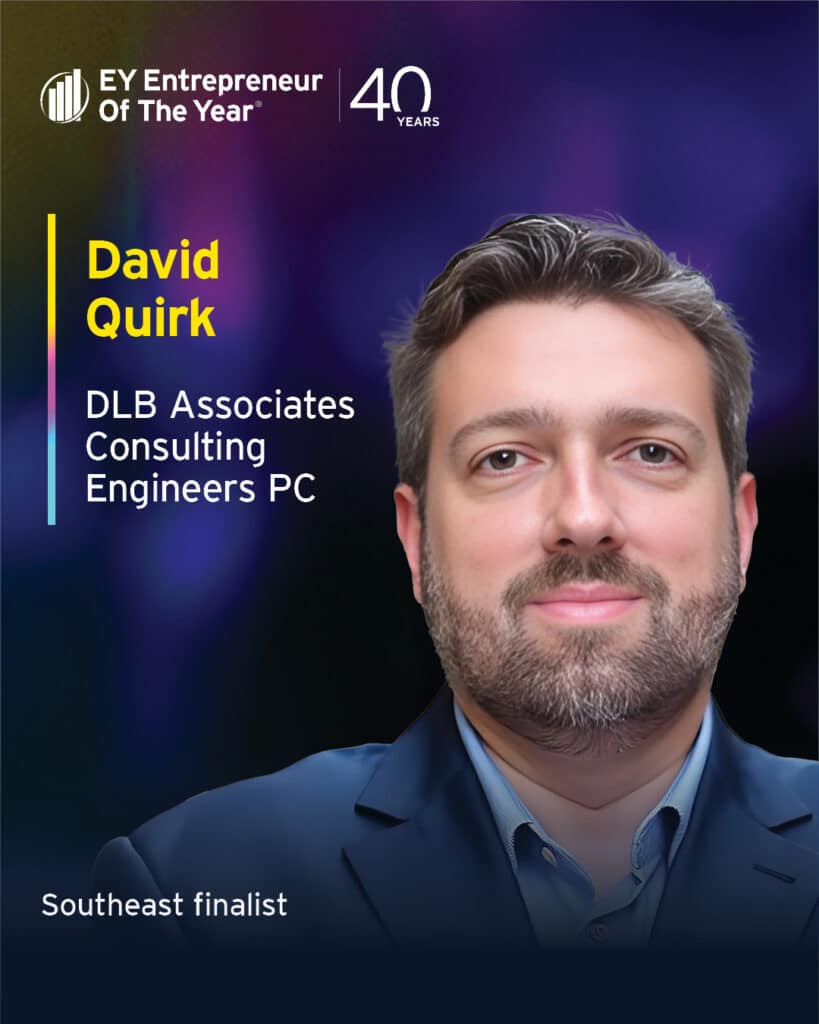

“This year’s finalists are leading examples of innovation, perseverance and resilience, illuminating paths to a brighter future for their industries and communities,” said Chevy Arnold, Entrepreneur Of The Year Southeast Program co-director.
“Their commitment to excellence transforms challenges into opportunities, inspiring us all,” added Kimberly Kicklighter, Entrepreneur Of The Year Southeast Program co-director.
Entrepreneur Of The Year honors many different types of business leaders for their ingenuity, courage and entrepreneurial spirit.
The program showcases original founders who bootstrapped their business from inception or who raised outside capital to grow their company; transformational CEOs who infused innovation into an existing organization to catapult its trajectory; and multigenerational family business leaders who reimagined a legacy business model to strengthen it for the future.
Including Quirk and Hanson, the 2025 Southeast finalists are:
- Marc Hodulich | 29029 | Atlanta, Georgia
- Damon Stafford | Alpine Intel | Charlotte, North Carolina
- Lou Hensley | Aspida | Durham, North Carolina
- Matthew Dent | Buffalo Rock Company | Birmingham, Alabama
- Melanie Little | Colonial Pipeline Company | Alpharetta, Georgia
- Will Bartholomew | D1 Training | Franklin, Tennessee
- Rene Diaz | Diaz Foods | Atlanta, Georgia
- David Quirk | DLB Associates Consulting Engineers PC | Peachtree Corners, Georgia
- Markus Scott | EyeQ Monitoring | Atlanta, Georgia
- Jon Gosier | FilmHedge | Atlanta, Georgia
- John Fitzpatrick | Force Marketing | Atlanta, Georgia
- Dr. Barry Patel | Galt Companies | Atlanta, Georgia
- Dr. Wade Smith | Galt Companies | Atlanta, Georgia
- Charles Gillespie | Gambling.com Group | Charlotte, North Carolina
- Kevin McCrystle | Gambling.com Group | Charlotte, North Carolina
- Mike Griffin | Griffin Brothers Companies | Cornelius, North Carolina
- Erin Hanson | Guardian Sports | Peachtree Corners, Georgia
- Dan Beem | Hissho Sushi | Charlotte, North Carolina
- Aaron Siegel | Home Team BBQ | Charleston, South Carolina
- Marc Murphy | Ignite Digital Services | Charleston, South Carolina
- Miller Chalk | Inglett & Stubbs, LLC | Mableton, Georgia
- Liza Rodewald | Instant Teams | Southern Pines, North Carolina
- Stephen Andresen | McClancy Foods & Flavors | Fort Mill, South Carolina
- Travis LeFever | Mission Mobile Medical Group | Greensboro, North Carolina
- Cyrus Mojdehi | Northway Homes | Charlotte, North Carolina
- Connor Ryan | NutraSky | Alpharetta, Georgia
- Fritz Owens | OTR Solutions | Roswell, Georgia
- Christopher Chuang | Relay, Inc. | Raleigh, North Carolina
- Kurt Jacobus | restor3d, Inc. | Durham, North Carolina
- Tom Kendrot | Shearwater Health | Nashville, Tennessee
- Teak Shore | Southern Lighting Source | Cumberland, Georgia
- Cindy Eckert | Sprout Pharmaceuticals | Raleigh, North Carolina
- Bryan Moore | TalkShopLive Inc. | Nashville, Tennessee
- Tina Moore | TalkShopLive Inc. | Nashville, Tennessee
- Igor Marinelli | Tractian | Atlanta, Georgia
- Joan Butters | Xsolis | Franklin, Tennessee
You can learn more about the finalists at ey.com/en_us/entrepreneur-of-the-year-us/southeast/winners-finalists.
Regional award winners will be announced on June 25 during a special celebration. The winners will then be considered by the national independent panel of judges for the Entrepreneur Of The Year National Awards, which will be presented in November at the annual Strategic Growth Forum®, one of the nation’s most prestigious gatherings of high-growth, market-leading companies.

About Entrepreneur Of The Year
Founded in 1986, Entrepreneur Of The Year has celebrated more than 11,000 ambitious visionaries who are leading successful, dynamic businesses in the U.S., and it has since expanded to nearly 60 countries globally.
The U.S. program consists of 17 regional programs whose panels of independent judges select the regional award winners every June. Those winners compete for national recognition at the Strategic Growth Forum® in November where national finalists and award winners are announced.
The overall national winner represents the U.S. at the EY World Entrepreneur Of The Year™ competition.
For more about the award, visit ey.com/us/eoy.
Related
Business
SCB Construction Group Partners with CGA Reps on New Peachtree Corners HQ
Published
3 weeks agoon
April 15, 2025
SCB Construction Group, freshly rebranded from SteelCo, secures construction project with CGA Reps for new office HQ in Peachtree Corners
SCB Construction Group has announced a strategic partnership with CGA Reps to build a new office headquarters in Peachtree Corners. The project, encompassing approximately 26,000 square feet of innovative workspace, marks a significant milestone in advancing CGA Reps’ corporate vision while showcasing SBA Construction Group’s commitment to delivering transformative construction solutions.
In collaboration with Oakley Real Estate Partners — serving as developers of the project on behalf of CGA Reps — this venture reflects a united effort to bring cutting-edge design (from Smallwood architecture firm) and operational excellence to the commercial kitchen equipment industry.
The announcement follows several high-profile projects for SCB Construction Group in 2024, including a 72,500-square-foot manufacturing center and headquarters for Process Equipment & Controls, an impressive interior build-out for Courtesy Ford Conyers’ commercial service center and the Phase 1 completion for StoreEase Loganville — recently honored as a 2024 Smart Facility of the Year by Modern Storage Media.
A bold new chapter for CGA Reps
The new 25,890-square-foot headquarters is designed to be more than just a workplace — it is envisioned as an inspiring environment that serves both client engagements and employee creativity. CGA Reps is recognized as an industry expert in commercial kitchen equipment, representing leading manufacturers, warehousing, distributing and installing everything from fryers to commercial walk-in freezers.

The facility’s design reflects this expertise, featuring a dedicated approximately 9,000-square-foot showroom kitchen that will host equipment demonstrations, tradeshows and webinars. This dynamic space will allow CGA Reps to showcase its comprehensive product range and provide clients with hands-on experiences of the latest commercial kitchen innovations.
A standout feature of the project is its innovative approach to stormwater management. With the site comprising only three acres, sufficient space for a traditional detention pond does not exist. To overcome this challenge, the design includes an underground detention system located beneath the truck court to efficiently handle all stormwater runoff.
This solution not only maximizes the use of the available land but also reinforces CGA Reps’ commitment to sustainable practices.
“We are excited to embark on this project with CGA Reps,” said Jay Bailey, CEO of SCB Construction Group. “This partnership underscores our commitment to customer excellence in design and construction, and it is a testament to the trust our clients place in our ability to deliver projects that not only meet but exceed expectations.”
Delivering excellence through proven expertise
SCB Construction Group’s track record in 2024 has been nothing short of remarkable. Earlier in the year, the company completed a 72,500 square foot manufacturing center for Process Equipment & Controls, integrating office space within a dynamic production facility.
This project was celebrated for its innovative design that balanced operational efficiency with a modern aesthetic, utilizing IMP panels to mimic tilt-up concrete, setting new standards for manufacturing environments.
Similarly, the interior build-out for Courtesy Ford Conyers’ commercial service center demonstrated SCB Construction Group’s ability to transform conventional spaces into functional and attractive environments that cater to both customer and staff needs.
The company’s commitment to quality and precision was again evident in the successful Phase 1 completion for StoreEase Loganville. This project, which recently earned the distinction of a 2024 Smart Facility of the Year by Modern Storage Media, highlights SCB Construction Group’s forward-thinking approach to construction and design, incorporating smart technologies and design that enhance sustainability and operational efficiency.
A rebranding that reflects a vision for the future
In a move that signals its evolution and growth, SCB Construction Group has recently rebranded from its former identity, SteelCo Buildings, as it spins off its construction division. This strategic rebranding is not merely cosmetic — it represents a renewed commitment to capabilities, credibility and client-focused service.
The refreshed brand is anchored by a new tagline “Deep Expertise, High Expectations” and a clear brand promise that communicates the company’s mission: to craft exceptional construction experiences based on precision, innovation and trust.
“Our rebranding is about more than just a new name or logo; it’s a renewed promise to our clients and communities,” explained Robert Lee, marketing director at SCB Construction Group. “We believe that our updated brand identity, including our invigorated tagline and mission statement, encapsulates our dedication to pushing the boundaries of design and construction. It reflects our commitment to creating spaces that are as inspiring as they are functional.”
Transforming spaces to inspire and connect
The new headquarters for CGA Reps is expected to become a landmark facility in Peachtree Corners. Beyond its impressive architectural design and advanced construction techniques, the building is planned as a hub for innovation and collaboration.

The interior build-out will include dynamic client reception areas, interactive meeting rooms, and dedicated spaces designed to foster creativity and teamwork among employees. The layout is crafted to ensure that every area of the facility contributes to a productive and inspiring work environment.
“By investing in this state-of-the-art facility, CGA Reps is making a strong statement about the future of work,” said Bryan Young, VP of construction at SCB Construction Group. “Our team is dedicated to designing and building spaces that not only serve the immediate needs of our clients but also create environments that motivate and inspire. The new headquarters will be a testament to that vision.”
Looking ahead
The partnership between SCB Construction Group and CGA Reps marks a significant step forward for both companies. As SCB Construction Group continues to build on its legacy of excellence and innovation, this project is poised to set a new benchmark for modern office headquarters design in the region.
With a strategic focus on creating spaces that inspire, connect and drive success, the future looks promising for both SCB Construction Group and its esteemed partner, CGA Reps.
For more information on the new headquarters project or to learn more about SCB Construction Group’s portfolio, visit scbcg.com.
Related
Read the Digital Edition
Subscribe
Keep Up With Peachtree Corners News
Join our mailing list to receive the latest news and updates from our team.
You have Successfully Subscribed!

GA Tech Launches First-of-its-Kind GT Atrium in Peachtree Corners

Katherine Lafourcade — A Journey of Passion, Resilience and Giving Back

Digital Edition

PCBA Announces 2025 Scholarship Winner

Paul Duke STEM High School Student Earns CGO Scholarship

World Blood Donor Day Starts Here: Theo’s Miracle, Katherine’s Mission [Podcast]

Executive Function: A Tribute to Working Moms

Peachtree Corners Grows Business Opportunities Through Economic Development

Simpson Elementary Marks Exceptional Children’s Week

Executive Function: A Tribute to Working Moms

Official City Merchandise Line Debuts This Saturday at Town Green

Peachtree Corners Grows Business Opportunities Through Economic Development

Digital Edition

World Blood Donor Day Starts Here: Theo’s Miracle, Katherine’s Mission [Podcast]

Paul Duke STEM High School Student Earns CGO Scholarship

PCBA Announces 2025 Scholarship Winner

Light up the Corners [Video]

Capitalist Sage: Business Leadership in Your Community [Podcast]

Cliff Bramble: A Culinary Adventure through Italy

Top 10 Brunch Places in Gwinnett County

A Hunger for Hospitality

THE CORNERS EPISODE 3 – BLAXICAN PART 1

Top 10 Indoor Things To Do This Winter

The ED Hour: What it takes to Remove Barriers from Education

Peachtree Corners Life
Topics and Categories
Trending
-
Digital Edition4 days ago
Digital Edition
-
Podcast4 days ago
World Blood Donor Day Starts Here: Theo’s Miracle, Katherine’s Mission [Podcast]
-
Community2 days ago
Executive Function: A Tribute to Working Moms
-
Business3 days ago
Peachtree Corners Grows Business Opportunities Through Economic Development









